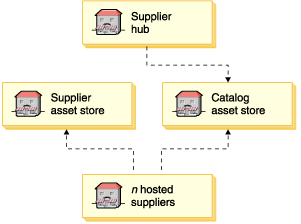
Supply chain business model
A supply chain is composed of the enterprises that provide services to a business. WebSphere Commerce provides the architectural infrastructure to support supply chains that take the form of a private marketplace, as well as through supplier sites.
A private marketplace provides a forum for vendors to offer their goods and services for sale. Buyers enter this forum and select the appropriate goods or services after browsing through the available options.
The following diagram illustrates an example of a supplier forum.

In this example, the buyer enters the supplier's hub to browse and interact with the aggregated catalog in which products and offers from multiple suppliers are presented. The buyer can then select their desired offers or request quotes from multiple suppliers. The buyer also has the option of conducting business or procuring from online suppliers directly.
Supply chain stores
The supply chain owner may create stores for its suppliers. This allows buyers to interact directly with suppliers, for example, by submitting orders under prearranged contracts. Supplier stores can coexist with a private marketplace so that buyers have the option of purchasing directly from their suppliers, or select suppliers through the private marketplace.
The following diagram illustrates the types of stores that compose the supply chain sample.

The supply chain sample site contains a hub (supplier hub), and two asset stores (catalog asset store and supplier asset store). Notice that the supplier hub uses the assets that are defined in the catalog asset store. The suppliers are created by using the assets from the catalog asset store and supplier asset store.
- SCP
- Supplier hub
- SPS
- Supplier asset store
- SHS
- Supplier hosted store